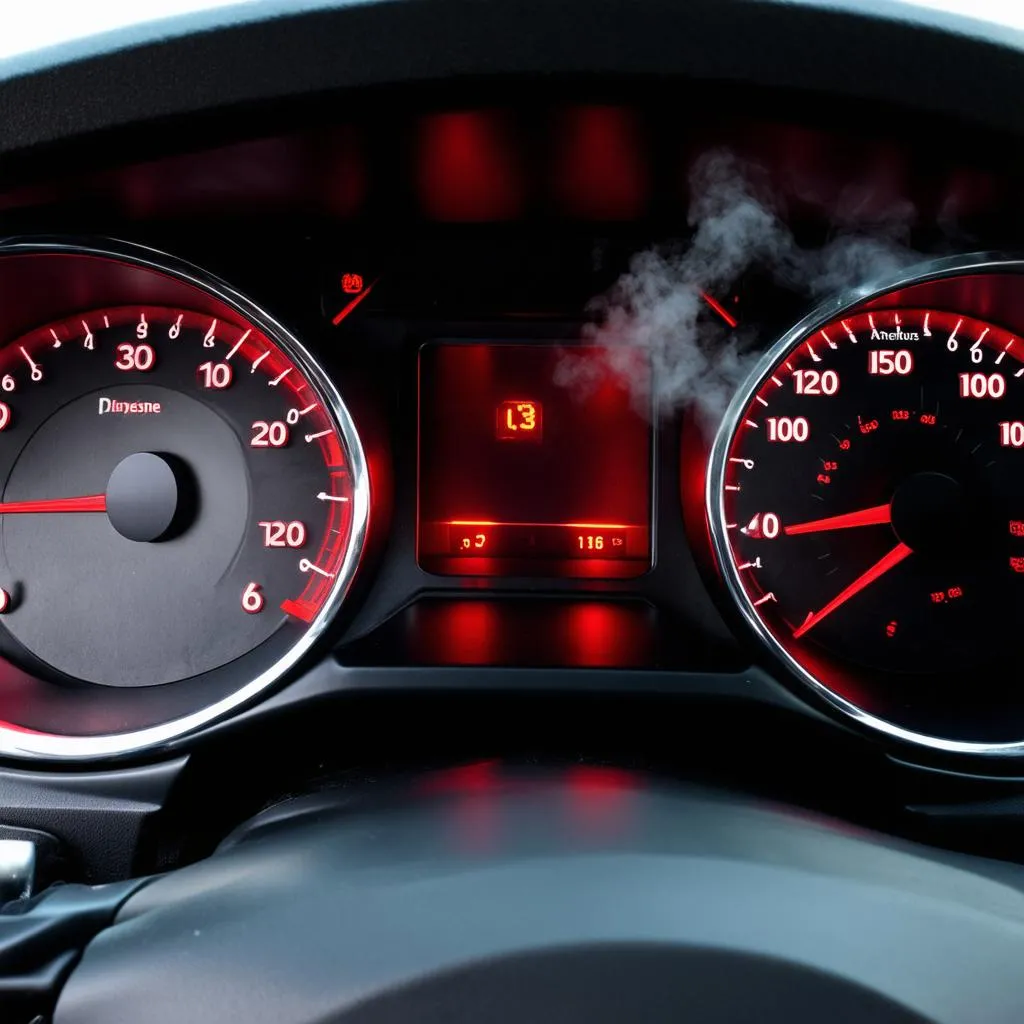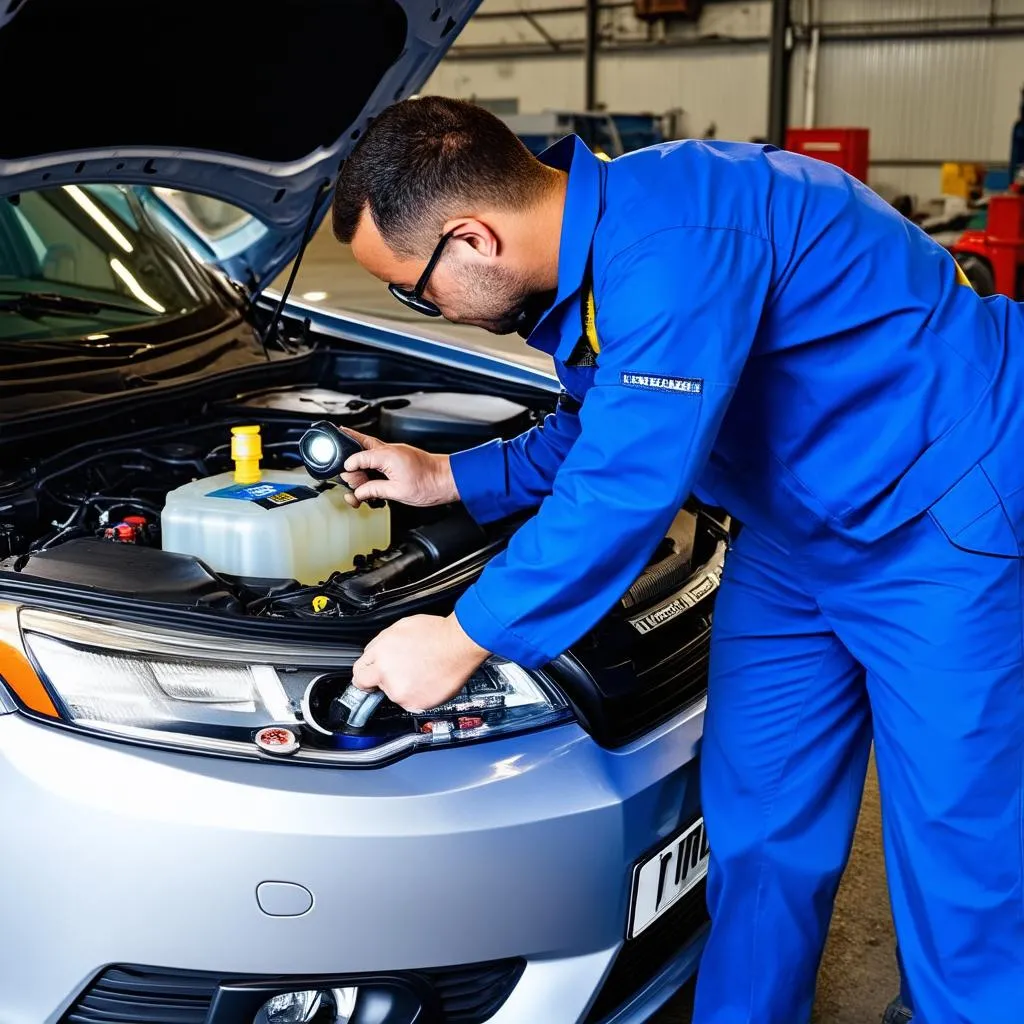“Oh no, the engine temperature gauge is spiking!” If you’ve ever muttered these words while driving through downtown Los Angeles, you know the heart-stopping feeling of a potentially overheating car. But what temperature actually spells trouble? Let’s delve into the nitty-gritty of engine heat and understand when that warning light should really send you running for the hills.
Understanding the Danger Zone: Decoding Your Car’s Temperature Gauge
Picture this: You’re cruising down Highway 1 in your trusty Ford Focus, windows down, enjoying the California sunshine. Suddenly, you notice the temperature gauge creeping up. Is this a cause for panic? Well, it depends.
Most cars operate within a specific temperature range, typically between 195 to 220 degrees Fahrenheit (90-105 degrees Celsius). This is considered the “normal” operating temperature, and your car’s cooling system works tirelessly to maintain it.
“Maintaining the optimal operating temperature is crucial for engine performance and longevity,” says automotive engineer Dr. Sarah Miller, author of “The Complete Guide to Automotive Cooling Systems.” “Excessive heat can lead to serious damage, even engine seizure.”
When “Hot” Becomes “Too Hot”: Identifying an Overheating Engine
While engines are designed to handle heat, exceeding the normal range signifies a problem. Generally, if your car’s temperature gauge climbs past 230 degrees Fahrenheit (110 degrees Celsius), it’s a clear indication of overheating.
Here are some telltale signs that your car might be overheating:
- Temperature gauge in the red zone: This is the most obvious indicator.
- Steam coming from under the hood: This indicates that coolant is boiling over.
- Sweet, syrupy smell: This could signify a coolant leak.
- Unusual noises from the engine: Knocking or pinging sounds could be a sign of overheating.
“If you experience any of these signs, it’s crucial to pull over immediately and address the issue,” cautions Dr. Miller. “Continuing to drive an overheating car can lead to catastrophic engine damage.”
Causes of Overheating: Unraveling the Mystery Under the Hood
An overheating engine is often a symptom of an underlying issue. Some common culprits include:
- Low coolant levels: Coolant absorbs heat from the engine and prevents overheating. Low coolant levels could be due to a leak or simply needing a top-up.
- Faulty thermostat: This valve regulates the flow of coolant through the engine. A malfunctioning thermostat can disrupt this flow, causing overheating.
- Broken water pump: The water pump circulates coolant throughout the system. A broken pump can lead to poor coolant circulation and overheating.
- Clogged radiator: The radiator cools down the hot coolant before it recirculates through the engine. A clogged radiator restricts this cooling process, causing the engine to overheat.
What To Do When Your Car Overheats: A Step-by-Step Guide
If you find yourself on the side of the road with an overheating engine, don’t panic. Follow these steps to minimize potential damage:
- Pull over safely: Find a safe spot to park your car away from traffic.
- Turn off the engine: This will stop generating heat and prevent further damage.
- Let the engine cool down: It’s crucial to allow the engine to cool down completely before taking any further action. This could take 30 minutes to an hour.
- Check the coolant level: Once the engine is cool, carefully open the coolant reservoir (refer to your owner’s manual for its location). If the level is low, top it up with a 50/50 mixture of coolant and water.
- Call for assistance: If you notice any leaks, if the coolant level is consistently low, or if the engine overheats again, it’s best to call a tow truck and have your car transported to a mechanic for a thorough inspection.
 car-overheating-dashboard-warning
car-overheating-dashboard-warning
Preventing Overheating: Proactive Steps for a Cool Ride
Preventing engine overheating is always preferable (and less stressful!) than dealing with the aftermath. Here are some proactive measures you can take:
- Regular maintenance: Get your cooling system flushed and checked regularly, as recommended by your car’s manufacturer.
- Monitor coolant levels: Check your coolant levels regularly and top them up as needed.
- Be mindful of driving conditions: Driving in hot weather or heavy traffic can put extra strain on your engine. Be sure to keep an eye on the temperature gauge and take breaks if necessary.
Frequently Asked Questions About Car Overheating
Q: Can I drive my car if it’s slightly overheating?
A: It’s strongly advised against driving an overheating car. Even slight overheating can cause damage over time. It’s best to pull over and address the issue.
Q: How often should I check my coolant levels?
A: It’s recommended to check your coolant levels at least once a month.
Q: Can using the heater help cool down an overheating engine?
A: While it might seem counterintuitive, turning on the heater can actually help draw heat away from the engine. It’s not a long-term solution, but it can help buy you some time to pull over safely.
Q: How much does it cost to fix an overheating car?
A: The cost of repair varies widely depending on the cause of the overheating. A simple coolant flush might cost around $100, while a major engine repair could cost thousands of dollars.
 car-engine-coolant-check
car-engine-coolant-check
Need Help with Your Car’s Diagnostics? We’re Here for You!
Dealing with car troubles can be stressful, but it doesn’t have to be. If you’re experiencing issues with your car’s temperature or any other diagnostics-related concerns, we’re here to help. Our team of automotive experts is available 24/7 to provide assistance and guidance.
Contact us via WhatsApp at +84767531508 for expert support with your car’s diagnostic tools. We’re here to keep you on the road!
Drive Cool, Stay Safe!
Remember, a well-maintained car is a happy car (and a happy driver!). By understanding your car’s cooling system and staying vigilant about maintenance, you can enjoy many miles of worry-free driving.
Looking for more car care tips and advice? Check out these related articles:
- Understanding Your Jetta’s Temperature Digital Gauge and OBD Codes
- Decoding Ancel OBD Transmission Temperature Readings
- Troubleshooting Temperature OBD Codes in Your 2004 GMC Envoy
We’d love to hear from you! Share your experiences, questions, and tips in the comments below. And don’t forget to share this article with your fellow car enthusiasts!
